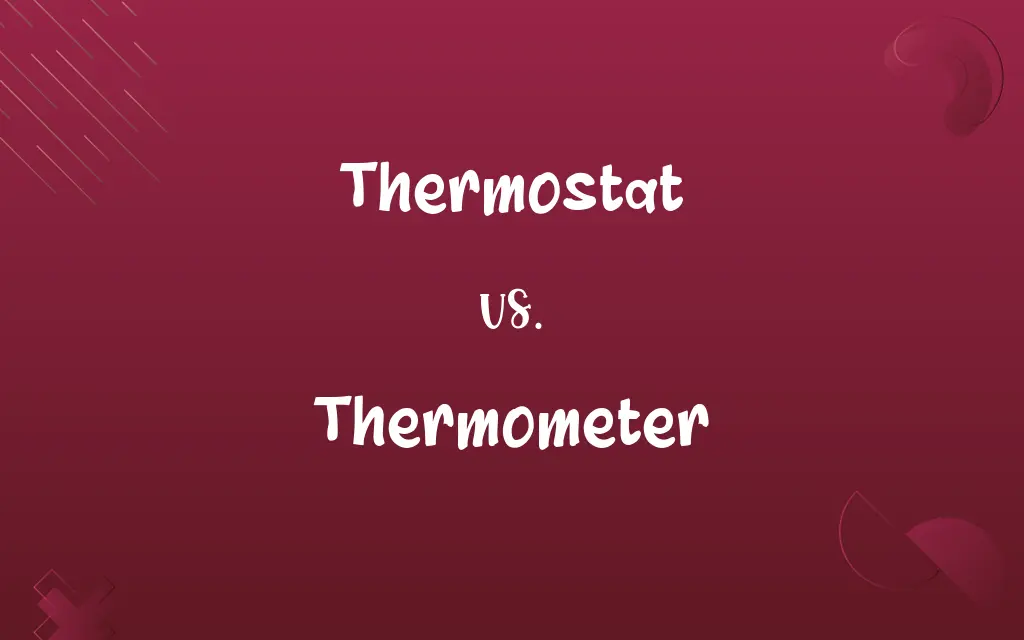Thermostat vs. Thermometer: Know the Difference

By Shumaila Saeed & Hifza Nasir || Published on April 6, 2024
A thermostat controls temperature by activating heating or cooling systems, while a thermometer measures and displays temperature.

Key Differences
Thermostats are devices designed to maintain a desired temperature by automatically controlling heating or cooling systems. Thermometers, on the other hand, are instruments used to measure and display the current temperature, without the ability to alter it.
Shumaila Saeed
Apr 06, 2024
Thermostat actively regulates the environment's temperature to a preset level, a thermometer passively records the temperature, providing real-time data but not intervening in the temperature conditions.
Shumaila Saeed
Apr 06, 2024
The functionality of a thermostat includes the capability to turn on or off heating and cooling devices based on the temperature setting. A thermometer lacks this functionality, serving solely as a tool for temperature observation.
Shumaila Saeed
Apr 06, 2024
Thermostats are essential in systems where maintaining a specific temperature range is crucial, such as in homes or refrigeration units. Thermometers are critical in both scientific research and daily life, for tasks ranging from cooking to monitoring weather conditions.
Dua Fatima
Apr 06, 2024
The utility of thermostats extends to energy efficiency, as they can reduce energy consumption by optimizing heating and cooling cycles. Thermometers, while not directly influencing energy use, can inform decisions related to temperature management.
Dua Fatima
Apr 06, 2024
ADVERTISEMENT
Comparison Chart
Functionality
Activates or deactivates heating/cooling systems
Displays temperature readings
Shumaila Saeed
Apr 06, 2024
Intervention
Can change environmental conditions
No ability to alter conditions
Shumaila Saeed
Apr 06, 2024
Application
Homes, HVAC systems, refrigeration units
Scientific research, cooking, weather monitoring
Hifza Nasir
Apr 06, 2024
Impact on Energy Use
Can optimize energy consumption
Does not directly affect energy u
Shumaila Saeed
Apr 06, 2024
ADVERTISEMENT
Thermostat and Thermometer Definitions
Thermostat
A device that regulates the temperature of a system.
The thermostat switched on the heat to maintain a cozy room temperature.
Dua Fatima
Feb 28, 2024
Thermometer
An instrument for measuring temperature.
The thermometer reads 32°F, indicating it's freezing outside.
Shumaila Saeed
Feb 28, 2024
Thermostat
A regulator for energy efficiency in temperature control.
Installing a programmable thermostat can reduce your heating bills.
Shumaila Saeed
Feb 28, 2024
Thermometer
A tool for culinary precision.
Using a meat thermometer ensures the chicken is cooked perfectly.
Hifza Nasir
Feb 28, 2024
Thermostat
Controls heating and cooling systems automatically.
The smart thermostat adjusts temperatures based on our daily routines.
Shumaila Saeed
Feb 28, 2024
ADVERTISEMENT
Thermometer
Vital in scientific research for accurate temperature readings.
Researchers use thermometers to monitor reactions at precise temperatures.
Hifza Nasir
Feb 28, 2024
Thermostat
An instrument for maintaining a set temperature.
We set the thermostat at 75 degrees to keep the house warm in winter.
Shumaila Saeed
Feb 28, 2024
Thermometer
Used to monitor environmental conditions.
We placed a thermometer outside to track the daily temperature fluctuations.
Hifza Nasir
Feb 28, 2024
Thermostat
Manages the operation of HVAC systems.
The faulty thermostat caused the air conditioner to run continuously.
Dua Fatima
Feb 28, 2024
Thermometer
Essential in medical diagnostics.
The doctor used a thermometer to check for a fever.
Shumaila Saeed
Feb 28, 2024
Thermostat
A device which automatically regulates temperature, or provides a signal used by another device to regulate temperature. The temperature-sensitive signal may be electronic, as that produced by a thermocouple. The signal may also be caused mechanically, as by the unequal expansion of different metals, liquids, or gases by heat, which can then cause the opening or closing of the damper of a stove, or the like, as the heat becomes greater or less than is desired.
Shumaila Saeed
Feb 27, 2024
Thermometer
An instrument for measuring temperature, especially one having a graduated glass tube with a bulb containing a liquid, typically mercury or colored alcohol, that expands and rises in the tube as the temperature increases.
Shumaila Saeed
Feb 27, 2024
Thermostat
(physics) An algorithm used to maintain a simulated system at a set temperature by absorbing or releasing heat
Shumaila Saeed
Feb 27, 2024
Thermostat
A device, as in a home heating system, a refrigerator, or an air conditioner, that automatically responds to temperature changes and activates switches controlling the equipment.
Shumaila Saeed
Feb 27, 2024
Thermometer
An instrument for measuring temperature, founded on the principle that changes of temperature in bodies are accompanied by proportional changes in their volumes or dimensions.
Shumaila Saeed
Feb 27, 2024
Thermostat
A device that automatically responds to changes in temperature by activating a heating or cooling system to maintain the temperature at a desired setting.
Shumaila Saeed
Feb 27, 2024
Repeatedly Asked Queries
How does a thermometer work?
It works by detecting temperature changes and displaying the value, often using mercury, alcohol, or digital sensors.
Shumaila Saeed
Apr 06, 2024
What is a thermometer?
An instrument used to measure and display the current temperature.
Shumaila Saeed
Apr 06, 2024
What is a thermostat?
A device that controls the temperature of an environment by regulating the operation of heating and cooling systems.
Hifza Nasir
Apr 06, 2024
How does a thermostat work?
It works by sensing the temperature of an environment and activating or deactivating heating or cooling systems to maintain a set temperature.
Shumaila Saeed
Apr 06, 2024
Can a thermostat measure temperature?
Yes, thermostats measure temperature to control heating and cooling systems effectively.
Shumaila Saeed
Apr 06, 2024
What types of thermometers are there?
There are several types, including digital, mercury, infrared, and alcohol thermometers.
Shumaila Saeed
Apr 06, 2024
Why is accurate temperature control important?
It's essential for comfort, energy efficiency, and in some cases, safety and process control.
Shumaila Saeed
Apr 06, 2024
Where are thermostats commonly used?
In homes, offices, and any place where maintaining a specific temperature is necessary.
Hifza Nasir
Apr 06, 2024
Are thermostats energy efficient?
Yes, especially programmable and smart thermostats, which optimize heating and cooling cycles.
Dua Fatima
Apr 06, 2024
Can a smart thermostat be controlled remotely?
Yes, many smart thermostats can be controlled through mobile apps or home automation systems.
Shumaila Saeed
Apr 06, 2024
How often should a thermostat be replaced?
There's no set time frame, but it's recommended to consider replacement if it's not functioning correctly or to upgrade to a more energy-efficient model.
Hifza Nasir
Apr 06, 2024
Can using a thermometer prevent illness?
Yes, especially in medical settings, where detecting fever early can lead to timely treatment and prevent the spread of infections.
Hifza Nasir
Apr 06, 2024
Can a thermometer control temperature?
No, thermometers can only measure and display temperature, not control it.
Shumaila Saeed
Apr 06, 2024
Where are thermometers commonly used?
In various settings, from kitchens and laboratories to outdoor environments, for temperature measurement.
Shumaila Saeed
Apr 06, 2024
Do thermometers need power to operate?
Some, like digital thermometers, need power, while others, like mercury or alcohol thermometers, do not.
Hifza Nasir
Apr 06, 2024
Share this page
Link for your blog / website
HTML
Link to share via messenger
About Author
Written by
Shumaila SaeedShumaila Saeed, an expert content creator with 6 years of experience, specializes in distilling complex topics into easily digestible comparisons, shining a light on the nuances that both inform and educate readers with clarity and accuracy.
Co-written by
Hifza Nasir








































































